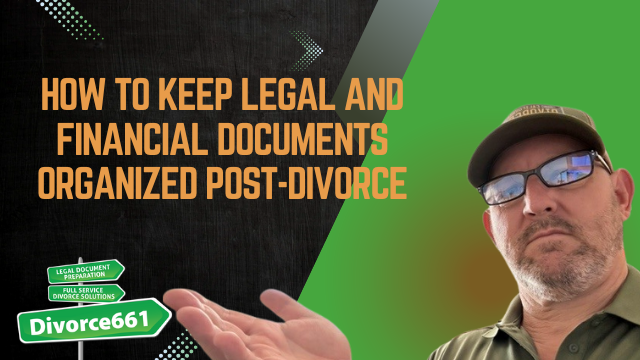How to Keep Legal and Financial Documents Organized Post-Divorce
Finalizing a divorce can feel like closing a challenging chapter, but the work doesn’t end with signing the papers. Staying organized with your legal and financial documents after divorce is essential for maintaining peace of mind and safeguarding your future. Tim Blankenship from Divorce661 shares practical advice on how to keep your important paperwork in order, avoid unnecessary stress, and be prepared for anything life throws your way.
Why Post-Divorce Document Organization Matters
Imagine waking up one day and realizing you can’t find your divorce papers. This kind of chaos can cause stress and create complications when you least expect it. Having easy access to your legal documents and financial records is not just about tidiness—it’s about protecting yourself. Organized documents help you stay ready for tax season, travel, refinancing, or any future modifications to your agreements.
Without a clear system, you risk delays, missed deadlines, and frustrating setbacks. In one example shared by Tim, a client faced weeks of delay refinancing her home simply because she lost her signed divorce judgement. This situation was easily avoidable with a proper filing system.
Key Documents to Keep Safe and Accessible
Some papers are absolutely critical to keep safe after your divorce. These include:
- Final Divorce Judgment – The official court order that finalizes your divorce.
- Settlement Agreement – Details how property, debts, and responsibilities are divided.
- Support Orders – Documents outlining spousal or child support obligations.
- Qualified Domestic Relations Order (QDRO) – If applicable, this is essential for dividing retirement accounts.
Keep both digital and physical copies of these documents in a secure location. Having backups ensures you’re prepared for tax time, travel, refinancing, or any future legal modifications.
Organizing Your Financial Documents
Beyond legal paperwork, your financial documents also need a solid organizational system. Here’s how to set it up effectively:
- Categorize Documents: Separate files by type, such as bank statements, property deeds, support payment records, tax returns, and insurance policies.
- Label Clearly: Use folders or digital folders labeled by category and year for quick retrieval.
- Track Support Payments: Keep a dedicated file for support payments and related communications to avoid confusion or disputes.
- Backup Digitally: Scan important documents and store them securely in the cloud or on an external hard drive.
This organized approach helps you monitor your financial status and ensures you have the documentation needed for refinancing, tax filings, or any legal inquiries.
Real-Life Example: The Importance of Staying Organized
Tim shares a real-life story about a client who experienced unnecessary delays due to missing documents. When she tried to refinance her home, the missing signed divorce judgment caused weeks of hold-ups. With Divorce661’s guidance, she now has a streamlined system that keeps all her critical documents organized and backed up.
This example highlights a simple truth: preparation is key to avoiding future hassles. Taking the time to set up a secure and easy-to-navigate filing system post-divorce can save you time, money, and stress.
How Divorce661 Can Help You Stay Organized
At Divorce661, we don’t just help you through the divorce process—we provide ongoing support to keep you organized and prepared for what comes next. Our team can guide you in setting up a simple yet effective file system tailored to your needs. We help you understand what documents to keep, how to store them securely, and how to maintain your records over time.
Staying organized post-divorce is your best defense against future stress and surprises. Whether you’re dealing with taxes, travel, refinancing, or potential modifications, having everything at your fingertips gives you confidence and control.
Take Control of Your Post-Divorce Future Today
If you’re feeling overwhelmed by the paperwork or unsure how to keep your documents in order, you’re not alone. Visit divorce661.com for a free consultation. Together, we’ll create a personalized organizational system that protects you and supports a stress-free future.
Remember, divorce is a major life transition—but it doesn’t have to be chaotic. With the right approach to your legal and financial documents, you can move forward with confidence and peace of mind.


